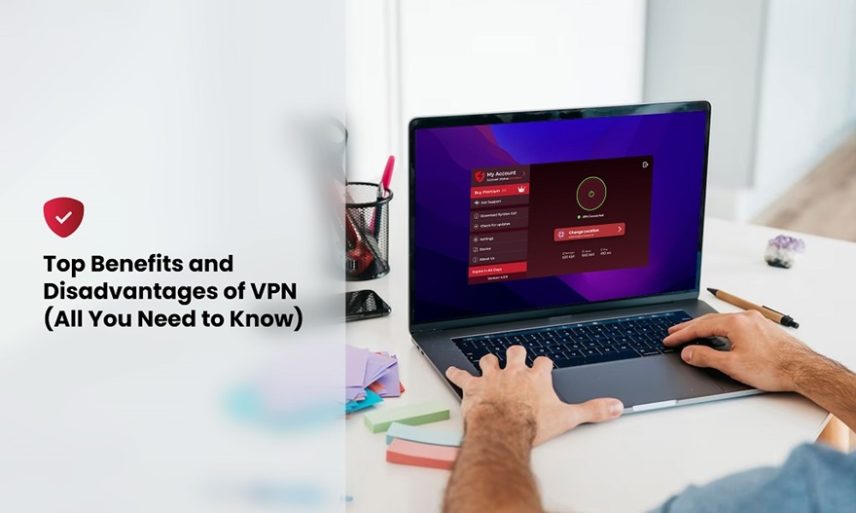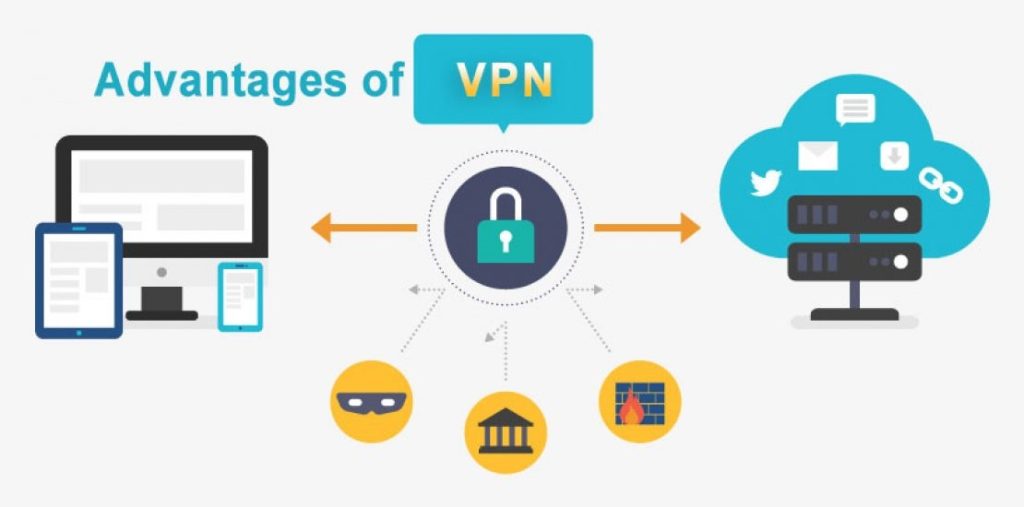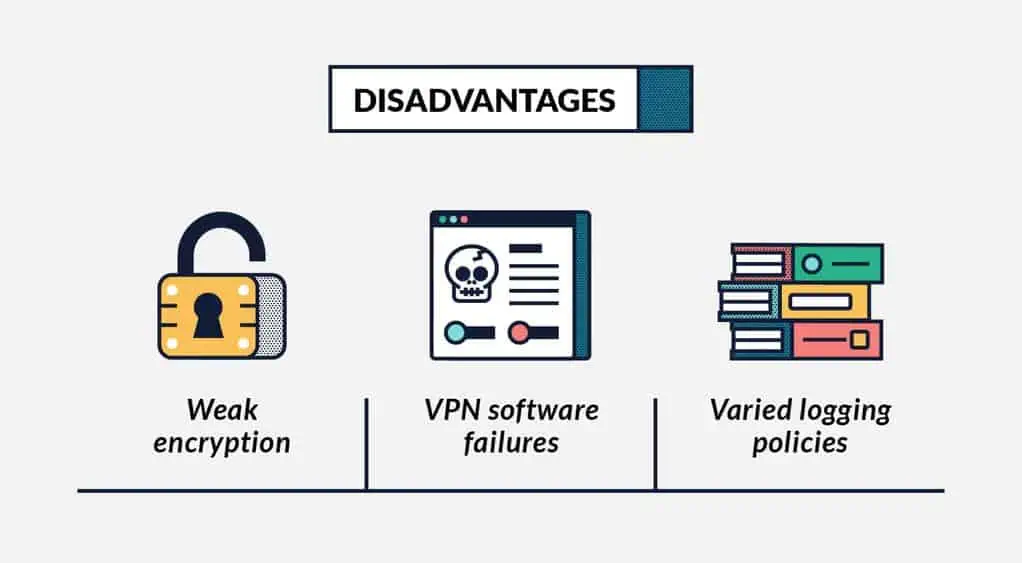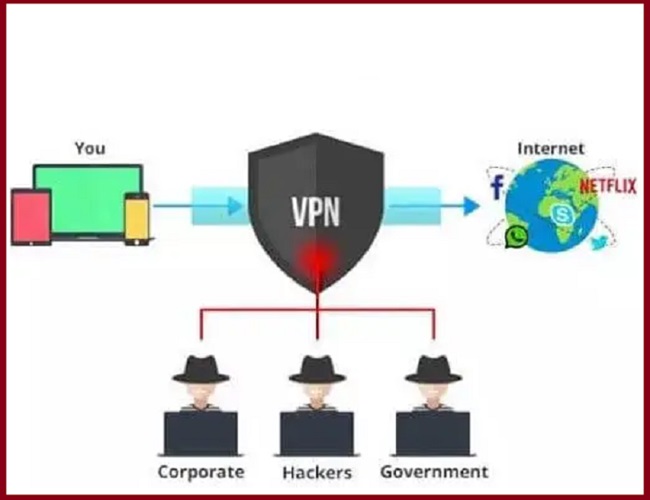
Top Benefits and Disadvantages of VPN – All You Need to Know
- April 4, 2023
- 9 minutes Read
- VPN Service
As online privacy and security become increasingly important, VPN (Virtual Private Network) technology has become critical to everyday internet usage.
VPN establishes a secure and private connection to the internet, thereby protecting your online activities from prying eyes. It encrypts your data with military-grade encryption so that nobody can intercept it. VPN also allows you to bypass geo-restrictions and countries with strong censorship, like China.
Although VPNs come with many advantages, they also have some potential disadvantages. Today, we’ll discuss VPN technology’s advantages and disadvantages. We will also discuss how VPNs work, the different types of VPNs, and the factors to consider when selecting a VPN provider.
Advantages and Disadvantages of a VPN: At a Glance
Find out what the advantages and disadvantages of a VPN are in the following table
| Advantages | Disadvantages |
| Protects security and privacy | Some VPN providers keep logs |
| Allows safe torrenting (P2P) support | Free VPNs don’t provide AES-256-bit encryption |
| Faster speeds compared to proxy servers | VPNs can be slower due to strong security or poor server configuration |
| Helps to bypass geo-restrictions/censorship | Free VPNs cannot bypass geo-restriction effectively and can be blocked. |
| Bypass ISP bandwidth and speed throttling | Some ISPs can use VPN block technology to block ports and prevent VPN from connecting |
| Dedicated servers enable smooth, no-lag gaming and streaming | Server and protocol availability varies based on different VPN providers |
| Kill switch to protect from IP leaks | Can have occasional connection drop issues |
| Good customizability for individuals and businesses | Some VPN provider doesn’t support router or Linux configuration |
| Compatible with major platforms | Long-term usage can slow down networks |
| Easy to configure and use on the go | Enterprise solutions can be complex to install |
8 Proven Benefits of Using a VPN

There’s no wonder VPNs have become popular among those looking to enhance their online privacy and security. Here are 8 most proven benefits of using a VPN on a daily basis:
- Enhanced Security and Privacy
One of the main advantages of using a VPN is improved online security and privacy. VPN encrypts all internet traffic between your device and the VPN server, making it impossible for hackers to intercept. This is especially important when using public Wi-Fi networks, as these networks are often unsecured and vulnerable to hackers.
- Access to Geo-restricted Content
Another advantage of using a VPN is the ability to access geo-restricted content. Many websites and online services are only available in certain countries. By connecting to a VPN server in a different country, you can bypass these restrictions and access content that would otherwise be unavailable.
- Anonymous Browsing and Torrenting
VPN also allows for anonymous browsing and torrenting. When you connect to a VPN server, your IP address is replaced with the VPN server’s IP address, making it difficult for anyone to trace your online activities. This is particularly useful for those who wish to download or share files anonymously.
- Protection of Public Wi-Fi Networks
As mentioned earlier, public Wi-Fi networks are often unsecured and vulnerable to hackers. By using a VPN, you can protect your online activities and personal information from potential threats when using public Wi-Fi networks.
- Improved Online Gaming Performance
A VPN can improve your online gaming experience by reducing lag and ping times. Connecting to a server closer to the gaming server can reduce latency and improve gaming performance.
- Avoid ISP Bandwidth/Speed Throttling
Internet throttling is when your ISP intentionally slows down your internet speed. You can bypass internet throttling and enjoy faster internet speeds using a VPN. That means you can enjoy high-speed downloads, movie streaming, and more.
- Protection Against Cyber Threats
A VPN can protect you from cyber-attacks, such as DDoS attacks, man-in-the-middle attacks, Phishing, Cryptojacking, etc., by encrypting your internet traffic and making it challenging for hackers to intercept your data.
- Secure Remote Access to Business Networks
Lastly, VPN technology allows for secure remote access to business networks. This is particularly important for remote workers or employees who travel frequently. VPNs enable secure and private access to business networks, allowing employees to access important files and data while on the go.
9. VPN Can Protect You on Dark Web
Using a VPN can also offer protection while browsing the dark web. The dark web is notorious for its potential risks, including cyber-attacks and surveillance. A VPN encrypts your internet traffic, helping to maintain anonymity and security, which is crucial when navigating this part of the internet. This additional layer of protection can help safeguard your personal information from malicious actors prevalent on the dark web.
4 Potential Disadvantages of Using a VPN

While VPNs offer many benefits, there are also some potential downsides to consider.
- Slower Internet Speeds
One of the significant disadvantages of using a VPN is that it can slow down internet speeds, especially free VPNs. This is because all internet traffic is routed through the VPN server, which can cause a bottleneck and result in slower speeds. However, some VPN providers offer high-speed servers to mitigate this issue.
- Cost of Using a VPN Service
Another drawback of using a VPN is the cost. Most VPN providers charge a monthly or yearly fee for their services, which can be expensive. However, free VPN services are available, although these may have limitations or have a higher risk of malware and scams. Know about the VPN Cost for a Small Business.
- Dependence on VPN provider
You depend on the VPN provider for security and privacy when using a VPN. Your personal information could be compromised if the VPN provider experiences a security breach or data leak. Also, some VPN company logs your data. Therefore, it is important to choose a reputable and trustworthy VPN provider with no log policy.
- Risk of Malware and Scams
Lastly, there is a risk of malware and scams when using VPN services. Some free VPN services may contain malware or be part of a scam to steal your personal information. Researching and choosing a reputable VPN provider to minimize these risks is important.
How Does a VPN Protect You?

VPN technology works by encrypting all internet traffic between your device and the VPN server. This is achieved through a process called encryption and tunneling.
Encryption involves the use of advanced mathematical algorithms to scramble data, making it unreadable to anyone who does not have the encryption key. This ensures that all data transmitted between your device and the VPN server is secure and private.
Tunneling involves creating a private connection between your device and the VPN server. Through a VPN tunnel, it establishes a connection through various protocols. VPN protocols determine how data is transmitted between your device and the VPN server and can impact security, speed, and reliability.
There are several types of VPNs, including remote access VPNs, site-to-site VPNs, and client-to-site VPNs. Remote access VPNs are the most common and are used to connect individual devices to a remote network, such as a work network.
On the other hand, site-to-site VPNs are used to connect entire networks, such as two company networks located in different geographical locations. Client-to-site VPNs are a hybrid of remote access and site-to-site VPNs, allowing individual devices to connect to a remote network as if they were part of that network.
Common VPN protocols include WireGuard, OpenVPN, PPTP, L2TP/IPSec, etc. OpenVPN is the most popular and known for its strong security and speed. PPTP is an older, widely used protocol but known for its security vulnerabilities.
L2TP/IPSec combines two protocols that provide strong security but can be slower than other protocols. Wireguard is a newer protocol designed to provide speed, security, and reliability, and it is considered the best option for most users.
How do you choose the right VPN for your needs?
When selecting a top VPN provider, there are several factors to consider. These include:
- Security & Encryption
- VPN Provider Reputation
- Customer Reviews
- Extra Security Features
- Ease of Use & Compatibility
- Lastly, Price Packages
VPN providers in countries with strict privacy laws are best suited to protect your data. The price of the service is also important, as VPN services can range from free to expensive. Free VPN services may seem appealing, but they often have limitations and may not offer the same level of security as paid VPN services.
The reputation of the VPN provider is also important, as you are entrusting them with your online activities and personal information. Research the provider’s history and read reviews from other users to ensure they are trustworthy and reliable.
Lastly, consider the features offered by the VPN provider. Some providers offer additional security features, such as a kill switch or obfuscated servers, while others may offer specialized servers for gaming, streaming, and torrenting.
Setting up a VPN on different devices can vary depending on the device and operating system. Most VPN providers offer step-by-step guides for setting up their service on various devices, including computers, mobile devices, and routers.
FAQs
What is the biggest advantage of a VPN?
The biggest advantage of a VPN is that it protects your online privacy and security from hackers, cyber threats, and surveillance. It also helps you access geo-blocked sites and content on Netflix, Amazon Prime, Hulu, BBC iPlayer, etc.
Does VPN make the internet faster?
Although a VPN can make your connection a little slower, it happens due to an extra layer of encryption to protect you from all cyber threats. The WireGuard protocol is now used by many VPNs, which provides great speed and security at the same time.
Does VPN drain the battery?
Yes, a Virtual Private Network does consume battery due to its encryption and decryption process. However, some VPNs have battery-saving features to reduce the power consumption. Additionally, using a VPN with an application kill switch can help to save battery as it helps to shut down the VPN when it’s not in use.
Wrapping Up
In conclusion, VPN technology offers many benefits, including enhanced security and privacy, access to geo-restricted content, and anonymous browsing and torrenting. Nevertheless, disadvantages include slower internet speeds, the costs associated with VPN services, and the possibility of malware and scams.
By choosing a reputable and trustworthy VPN provider and following best practices for using a VPN, you can enjoy the many benefits of this technology while minimizing the risks. VPN technology is essential for internet users who value online privacy and security. As technology continues to evolve, we can expect VPNs to become even more advanced and widespread.





